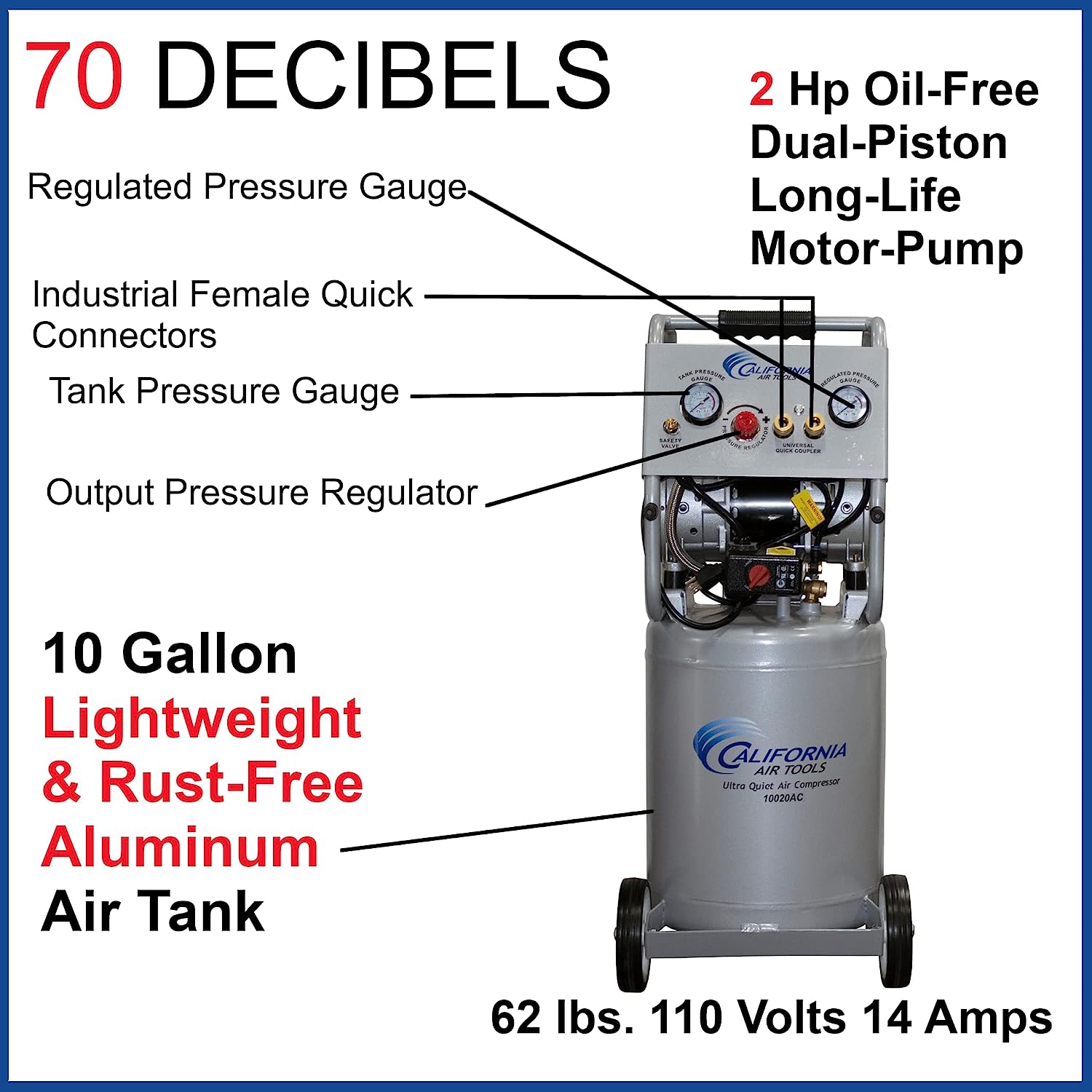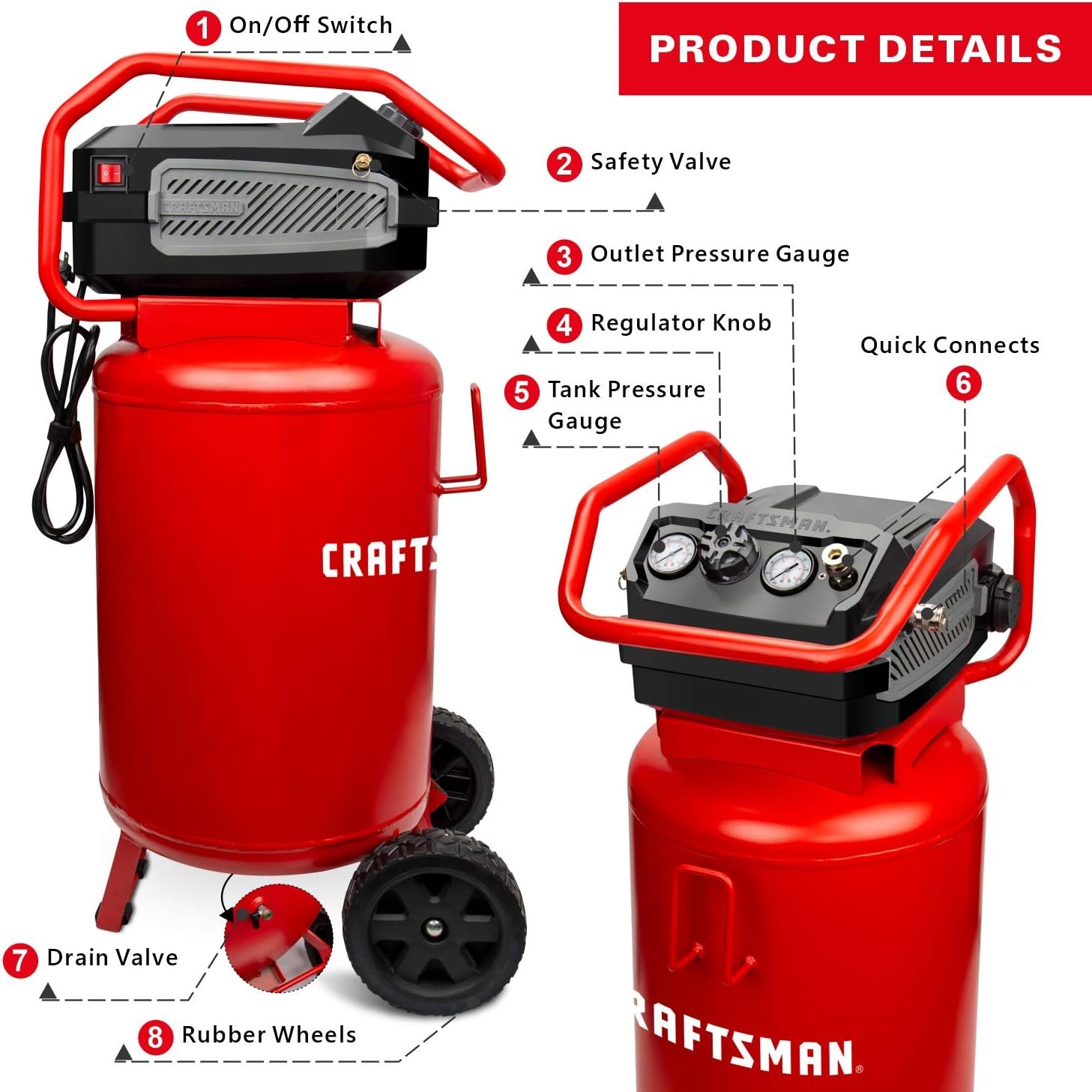If you have an air compressor at home or in your workplace, it’s important to be aware of the signs that it may be malfunctioning. This article will highlight some common indicators that could signal a problem with your air compressor. By understanding these warning signs, you can take action early on and prevent further damage or potential safety hazards. So, let’s dive in and learn how to recognize the signs of a malfunctioning air compressor!
Abnormal Noise
Squeaking
If you notice a squeaking sound coming from your air compressor, it could indicate a potential issue. The squeaking noise may be due to worn-out bearings, belt tension problems, or simply a lack of lubrication. It’s essential to address this noise promptly to prevent further damage to the compressor. Checking the bearings for wear and tear, adjusting the belt tension, and ensuring proper lubrication can help resolve the squeaking issue.
Rattling
A rattling noise from your air compressor is another sign of a potential malfunction. The rattling sound may indicate loose or broken components within the compressor. It could be caused by loose screws, bolts, or even internal damage. If you hear a rattling noise, it’s crucial to investigate and tighten any loose parts. However, if the rattling persists, it’s advisable to consult a professional technician to assess and repair the issue.
Grinding
Grinding noises coming from your air compressor can be a cause for concern. This noise often indicates metal-on-metal contact, which is indicative of a significant problem. Grinding noises can result from worn-out gears, malfunctioning motor bearings, or damaged internal components. If you notice grinding sounds, it’s best to shut off the compressor immediately to prevent further damage. Contacting a trained professional for a thorough inspection and repair is crucial in this situation.
Leaking
Air Leaks
Air leaks can be a common problem with air compressors and should not be ignored. These leaks can occur in various parts of the compressor, such as hoses, connectors, or fittings. If you notice a hissing sound or detect a steady stream of air escaping from your compressor, it’s a clear indication of an air leak. Addressing air leaks promptly is essential to maintain optimal performance and efficiency. Inspecting and replacing damaged hoses or connectors and ensuring proper sealing can help resolve air leaks.
Oil Leaks
Oil leaks are another issue that may arise with air compressors. These leaks can occur due to damaged gaskets or seals, loose fittings, or even cracks in the compressor’s housing. If you spot oil stains or puddles around your compressor, it’s crucial to address the issue as soon as possible. Regularly inspecting and replacing damaged gaskets, seals, or fittings can help prevent oil leaks and potential damage to the compressor.
Overheating
Hot Motor
An overheating motor can be a significant concern when it comes to air compressors. If you notice excessive heat or a burning smell coming from the motor, it’s essential to address the issue immediately. Overheating can be caused by a variety of factors, such as insufficient ventilation, a malfunctioning cooling system, or overloaded components. Checking for proper ventilation, inspecting the cooling system, and avoiding overuse of the compressor can help prevent motor overheating.
Excessive Heat from Compressor
In addition to a hot motor, feeling excessive heat coming from the compressor itself can also indicate a potential problem. Excessive heat may be a result of overworked components, an overloaded system, or an issue with the compressor’s internal mechanisms. If you notice excessive heat, it’s crucial to turn off the compressor and allow it to cool down before investigating further. Consulting a professional technician to diagnose and repair the issue is recommended in such cases.
Low Pressure
Inconsistent Output
If your air compressor is delivering inconsistent pressure, it’s a clear indication of a malfunction. Inconsistent output can be frustrating, especially when you rely on your compressor for various tasks. This issue may be caused by a faulty pressure switch, worn-out valves, or air leaks within the system. It’s important to address this problem promptly to ensure efficient operation. Inspecting and repairing or replacing any faulty components, as well as addressing air leaks, can help restore consistent pressure output.
Slow Pressure Build-Up
Another common sign of a malfunctioning air compressor is slow pressure build-up. If you notice that it takes a significantly longer time for your compressor to reach the desired pressure, it could indicate an issue. Slow pressure build-up can be a result of worn-out pistons, damaged valves, or even inadequate power supply. It’s crucial to diagnose the cause of this problem to avoid potential damage to the compressor. Consulting a professional technician to assess and repair the issue is recommended in this situation.
Tripped Circuit Breaker
Frequent Tripping
If your air compressor’s circuit breaker frequently trips, it’s an indicator of an electrical problem. This issue can be caused by various factors, including overloading the circuit, faulty wiring, or a malfunctioning motor. It’s crucial to address circuit breaker tripping promptly to prevent damage to the compressor and ensure electrical safety in your workspace. Inspecting the circuit’s load capacity, checking for faulty wiring, and consulting an electrician if necessary can help resolve this issue.
Inability to Reset
If your air compressor’s circuit breaker refuses to reset after it has tripped, it’s essential to take immediate action. The inability to reset the circuit breaker often indicates a severe electrical problem within the compressor. It may be caused by a short circuit, a damaged motor, or a malfunctioning electrical component. In such cases, it’s crucial to discontinue using the compressor and contact a professional technician for inspection and repair.
Vibration
Excessive Vibrations during Operation
Excessive vibrations during operation can be a cause for concern with your air compressor. If you notice that your compressor is vibrating excessively, it may indicate an issue with its internal components or its foundation. Excessive vibrations can result from loose or damaged parts, misaligned components, or an unstable surface. It’s important to address excessive vibrations promptly to prevent further damage and ensure safe operation. Checking for loose parts, realigning components, and placing the compressor on a stable surface can help reduce vibrations.
Electrical Issues
Flickering Lights
If the lights in your workspace flicker when your air compressor is running, it may indicate an electrical problem. Flickering lights can be caused by power surges, insufficient wiring, or a faulty electrical connection. It’s crucial to address this issue promptly to prevent further electrical complications. Checking the power supply, inspecting the wiring, and consulting an electrician if necessary can help resolve the flickering lights issue.
Failure to Start or Shut Off
If your air compressor fails to start or shut off as it should, it’s a clear sign of an electrical issue. This problem may be caused by a faulty pressure switch, a malfunctioning motor, or a problem in the electrical supply. It’s important to troubleshoot this problem to avoid potential damage to the compressor and ensure its proper operation. Inspecting and replacing faulty components, checking the power supply, and consulting a professional technician can help resolve the failure to start or shut off issue.
Excessive Moisture
Water Accumulation
Excessive moisture or water accumulation within your air compressor can pose a problem. Moisture can result from condensation, improper drainage, or even a malfunctioning air dryer. If you notice water accumulation or excessive moisture, it’s crucial to address the issue promptly to prevent corrosion and damage to the compressor. Regularly draining condensate, inspecting and repairing the air dryer, and ensuring proper ventilation can help reduce moisture within the compressor.
Air Tools Get Wet
If your air tools or equipment are getting wet during operation, it may indicate a problem with your air compressor. Wet air can be caused by excessive moisture within the compressor or a malfunctioning air dryer. Operating air tools with wet air can affect their performance and even cause damage. It’s important to address this issue promptly to avoid further complications. Checking for moisture within the compressor, inspecting and repairing the air dryer, and properly draining condensate can help eliminate wet air and ensure optimal tool performance.
Oil Contamination
Dirty Oil
Dirty oil within your air compressor can be a sign of a potential problem. Contaminated oil may result from improper maintenance, inadequate filtration, or worn-out internal components. If you notice dark or dirty oil in your compressor, it’s crucial to address the issue promptly to prevent further damage and maintain optimal performance. Regularly checking and changing the oil, ensuring proper filtration, and inspecting the internal components can help prevent oil contamination.
Oil Emulsification
Oil emulsification, or the presence of milky or foamy oil, is another indication of a malfunctioning air compressor. Emulsification occurs when water or moisture enters the oil system and mixes with the oil. This can be caused by excessive moisture within the compressor, a malfunctioning air dryer, or a damaged oil separator. It’s important to address oil emulsification promptly to prevent damage to the compressor and ensure the longevity of the oil. Regularly checking for moisture within the compressor, inspecting and repairing the air dryer, and replacing the oil separator if necessary can help prevent oil emulsification.
Poor Performance
Inefficient Operation
If your air compressor is operating inefficiently, it may be a result of various factors. Inefficient operation can be characterized by longer-than-usual run times, frequent cycling, or inadequate pressure output. This issue can be caused by worn-out or damaged components, inadequate maintenance, or even using the wrong type of compressor for your specific application. It’s crucial to address poor performance promptly to ensure efficient operation and prevent further damage. Regular maintenance, inspecting and repairing any faulty components, and consulting a professional if necessary can help improve the overall performance of your air compressor.
Inconsistent Pressure
Inconsistent pressure output is another sign of poor performance in an air compressor. If you notice fluctuations in the pressure delivered by your compressor, it could indicate underlying issues. Inconsistent pressure can result from faulty valves, air leaks, or inadequate compressor size for the intended application. Addressing this issue is crucial to ensure consistent and reliable performance. Inspecting and replacing faulty valves, addressing air leaks, and consulting an expert to determine the proper compressor size can help resolve the inconsistent pressure problem.
In conclusion, being aware of the common signs of a malfunctioning air compressor is important to catch potential issues early and prevent further damage. Whether it’s abnormal noises, leaks, overheating, low pressure, tripped circuit breakers, vibrations, electrical problems, excessive moisture, oil contamination, or poor performance, addressing these signs promptly can help maintain the efficiency and longevity of your air compressor. Regular maintenance, proper troubleshooting, and professional assistance when needed can ensure that your air compressor operates smoothly and reliably for years to come.
Joey has over 15 years of experience in the air compressor industry. As a senior test manager at Pneumatic Performance Labs, he oversees all testing and evaluation of air compressors. Known for his technical expertise and leadership, Joey has built a strong team of engineers who provide trusted third-party testing capabilities to air compressor companies nationwide.









